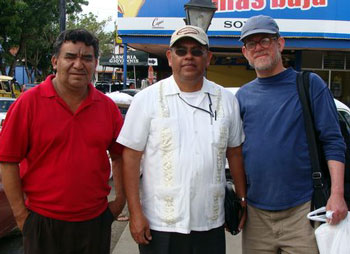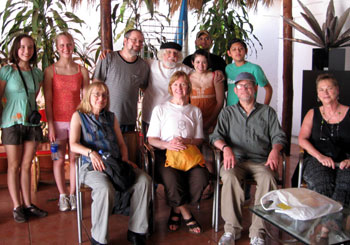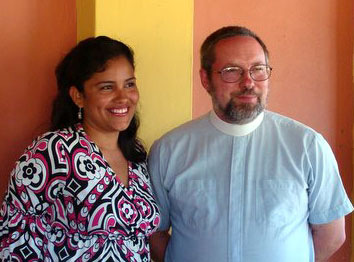Open Letter 2: A Nicaraguan Interlude

Sandy Iran Canales, Rev. Bayardo Lopez Garcia and Karl Pohrt in Catarina, Nicaragua. Pohrt was part of a delegation that traveled to Catarina to celebrate the wedding anniversary and ministry of Rev. Garcia, Padre of the Church of the Remnant.
In the midst of all the sturm und drang surrounding the future of Shaman Drum Bookshop, I went to Nicaragua.
Dianne, my wife, had been teaching for the last month in Catarina, a town in the mountains south of Managua. She volunteered under the auspices of the Episcopal Church of the Incarnation, a small congregation in Ann Arbor of which we are both members. ECI is collaborating with the Iglesia Bautista Remanente, a Baptist church in Catarina, on projects that “will bridge the divide between wealth and impoverished countries by providing capital, employment and opportunities for cultural exchange.”
Joe Summers, our minister, is an old friend of mine – we worked together in the bookshop years ago – and ECI is an openhearted, diverse community that is serious about creating a better world. Although I’ve been mostly engaged with Buddhism in my adult life, I was attracted to this church because of the willingness of Joe and the congregation to struggle together around difficult issues. And I still enjoy a good sermon.
I hadn’t had much of a chance to talk with Dianne about the state of the bookshop given that our telephone and internet connections were short and infrequent. The experience teaching in Catarina was transformative and very positive for her, but living conditions were difficult. She asked me to come. I traded my frequent flyer miles for a ticket to Nicaragua.
I traveled to Nicaragua with a delegation of eight members from the church. There were many moments during the trip when these good people made me feel that it might still be possible to fix (or at least patch up) this broken world. The delegation came to Catarina to celebrate the wedding anniversary and the ministry of Bayardo Lopez Garcia, Padre of the Church of the Remnant.
After Haiti, Nicaragua is the second poorest country in the western hemisphere, according to Joe. The U.S. State Department says it is “prone to a wide variety of natural disasters, including earthquakes, hurricanes, and volcanic eruptions.” The country, situated on two converging tectonic plates, is a “Belt of Fire.”
Nicaraguan history has been every bit as volatile as its geography. From 1853 until the Great Depression, the U.S. Marines landed there seven times and occupied the country for twenty one years. In 1937, General Anastasio Somoza seized control of Nicaragua. He and two subsequent Somozas robbed and thugged the country blind until 1979, when Tachito Somoza was overthrown by the FSLN (Frente Sandinista de Liberacion Nacional), named after Augusto Sandino who led an armed insurrection against U.S. interests in 1937.
From 1981 to 1990, the C.I.A. ran a secret operation to topple the government, mining harbors and financing the Contras, who fought a vicious civil war against the Sandinistas.
The current government is led by Daniel Ortega and is a coalition of the Sandinistas and the Liberal Party. Ortega is widely believed to have stolen the last election, and his leftist posture is seen as a rhetorical cover to rob the country. I’m told he requires his staff to address him as El Commandante.
Catarina is a windy town of eight thousand souls perched on the lip of an extinct volcano, which is now a lake. During a recent earthquake, people reported that the water in the lake sloshed around like it was boiling. The town is paved with flagstones and you can still see men on small, fast horses galloping up the steep streets.
Just inside the cemetery at the edge of Catarina is the grave of Benjamin Zeledon, leader of a 1912 uprising against a puppet government installed by the United States. He was killed by government troops, who then dragged his body through town. Augusto Sandino, a teenager at the time, witnessed the desecration of Zeledon’s body, which led to his radicalization.
I stayed at the Hotel Jaaris. Rooms there rent for ten dollars a night. Water was only sporadically available, and there has been a serious shortage in the area, which set off a noisy protest demonstration in Catarina a week before I arrived. The hotel did not have hot water.
The walls in our room didn’t meet the corrugated metal ceiling, so you could hear what was going on in the other rooms. The metal roof created an almost perfect interior acoustic bounce. Some nights it was difficult to sleep.

The poet-activist Ernesto Cardenal (back row, center) with the Ann Arbor delegation from the Episcopal Church of the Incarnation to Catarina.
No matter. The vibe was positive. The hotel had a pet bird and a barking dog. There were lots of clucking chickens and crowing roosters in the next building. And the people of Catarina were extraordinary. Near the end of our stay a number of them said they would pray for us. I’m not used to having people speak to me this way. I always felt it was my responsibility to cultivate Great Doubt – as the Buddhists say – around religious claims, but it became increasingly obvious to me during this trip that people living in such impermanent economic, political and geographical circumstances just might know some things I didn’t.
I replied gracias when people said they would keep me in their prayers.
I had the good luck during the trip to meet the poet-activist Ernesto Cardenal. One morning we drove to the Galeria casa de los Mundos in Managua to look at Nicaraguan folk paintings from the Primitive Painting School. The building is also Cardenal’s residence, and he was in his office. At eighty four he is still very active and spry. He greeted us warmly, signed autographs and posed for pictures.
Cardenal was Minister of Culture in the Sandinista government following the revolution, but he has dissociated himself from Daniel Ortega. Ortega has countered by freezing all of Cardenal’s assets. Although he is obviously beleaguered, he seems at peace with his situation.
Cardenal’s poetry is direct and accessible, and it is clear that North American Beat poets influenced him stylistically. His books have been widely translated and are available in the U.S. from City Lights Publishers, New Directions and Curbstone Press. He is the most important living poet in Nicaragua, which is a country that values its poets. The great Nicaraguan poet Ruben Dario’s picture graces the Nicaraguan currency.
Cardenal is also a Catholic priest and was a friend of the Trappist monk Thomas Merton. In the early 1970s he founded a lay religious community on one of the islands in the Solentiname archipelago in Lake Nicaragua. Among various other community projects, he read the Bible with a small group of campesinos. Cardenal asked them to respond from their own lived experience. He recorded the conversations and eventually published them as “The Gospel in Solentiname” in four volumes. They are among my favorite books. They were published in the U.S. by Orbis Books, and I’m afraid are now out of print.
At the Church of the Incarnation in Ann Arbor the congregation is invited to reflect on the sermon immediately after it is given. This is modeled on base communities like Cardenal’s that were developed by Latin American Liberation Theologians in the 1970s. They exemplify a radically democratic hermeneutic.
Joe told me, paraphrasing Martin Luther, that “the scriptures become the Word of God in the hearing of the believer. This is a wonderfully nuanced view; very different from saying the scriptures are the Word of God. It becomes an active, dynamic process – it’s what is meant when we say this is the living Word of God.”
Christianity offers its adherents a rich and vibrant set of symbols and stories – as do all the major religions – and it provides a context in which people can structure their experience and give meaning to their lives. At its best, it is a powerful force for social change, a counter-cultural critique of the dominant society. Cardenal represents this form of religious culture.
And politics are another context. We spent a remarkable evening talking with five Catarinians about local and national politics in Nicaragua. Four of them were former Sandinista companeros. (Joe told me he preferred companeros to comrades because its etymology implies “to break bread with.”) These men, now middle aged, had all been active in the 1979 revolution.
Near the end of the night I asked what it was like to participate in a revolution and then see its ideals eroded, compromised and betrayed. Perhaps it was impertinent of me to ask this question because it implied assumptions I had no right to make, but they welcomed the opportunity to reflect on their experience.
Ariel Perez Olivas, a former Sandinista political analyst, said, “It makes me homesick when I think of the ideals and goals of the revolution in the early days. All our resources were used up in the war with the Contras. Now we have to deal with the problem of an entrenched political class that is focused on its own interests.”
Sandy Iran Canales, who still carries fragments of a bullet in his chest from a wound he received in 1979, told us, “When I was young I was moved to fight against the National Guards. All the people were so excited by the revolution, but then lands were stolen and money was misused.”
One of the men said, “Our revolution has become a rob-olution.”
Erving Sanchez, the former mayor of Catarina, said, “The government wants to politicize everything. They show favoritism. When I was mayor, we sat down together to support the people who really needed it. We need to form a culture of resistance against the national leadership. To me, Sandinista means simply to find a way to help the poor.”
Joe ended the evening with a riff on Kierkegaard. “We begin in the land of the aesthetic, which is a place of endless choices. Then we grow into the ethical life. We make commitments. At a certain point we fail at them. This will lead you to the life of faith or you can chose to return to the aesthetic life. Faith begins when what you’ve given your life to betrays you.”
____________________________
On the drive back to Catarina following a visit to a Spanish School I start to nod off, but it is difficult because I’m sitting between Joe and Bayardo, who are having a spirited discussion in Spanish with Sandy, our driver. After a few minutes Joe translates.
He says Bayardo and Sandy are talking about the Sandinista Literacy Campaign in 1981 when High School seniors went into the countryside to teach the campesinos to read.
In two years illiteracy was cut in half in Nicaragua, despite the murder and rape of many students by the Contras.
Bayardo tells us he hid books underneath his poncho as he moved on horseback around the countryside.
“We carried lanterns with us so we could teach people at night. I was teaching in a relatively sparsely populated area filled with Contra soldiers. There were spies all around and I had to move from house to house fairly quickly or I would be betrayed.”
“I was very frightened,” he says and then laughs.
Then he and Sandy break into song. They sing the anthem of the Sandinista Literacy Campaign:
Avancemos brigadistas Muchos siglos de incultura caerán Levantemos barricadas De cuadernos y pizarras Vamos a la insurrección cultural.
-
Jennifer Reyes Rosales translated the lyrics:
Let's advance brigadistas Many centuries of illiteracy will fall Let's build up barricades Of notebooks and blackboards All the people to the Cultural Revolution.
-
So there you have it. I’m riding down the road with two men who are laughing and singing together after they recall risking their lives thirty years ago to teach people to read.
These men speak about what happened with … a great lightness. To speak any other way about these things would not be appropriate, but what they are saying is simply so far outside of my own experience that it is unimaginable to me.
It strikes me that this is why I came to Nicaragua. I was meant to hear this shocking and moving testimony.
If these men were willing to risk their lives to teach people to read, the least I can do is to try to keep the bookshop going. Despite the downturn in the economy and all the trash talk about the “death of the book,” I intend to do just that.
Life is very strange. When I left Ann Arbor I felt it was the most inappropriate time in my life to leave town. By the end of the trip my opinion had changed. It was the perfect moment.





Karl:
Time for new priorities.
Take what you need, give the rest away.
Stan
well Karl, I guess you too have another horse to get back on!
welcome home, congratulations to you and Diane for living a meaningful life!
Love
Laurie
Daniel has done what he can to keep the reins from the hands of Violetta Chamorro and others to the right to preserve a semblance of the Sandinista way.
I traveled through the war zones as a photographer for Oxfam in 1984. I know Nicaragua from Somoza days to now. Those who oppose Ortega seem to be either anti-Catholic or feminist, splitting hairs. This is a country that can’t afford intellectual hair-splitting by comfortable 1st world armchair types. His pragmatism allows the revolution to persevere.
When Paul McCartney and John Lennon quarrelled, did we write off the Beatles?
Dear Karl,
Thank you so much for reminding us that MEANING is more important than GETTING. Joe Summers is a dear friend to me as well, and I’m so thrilled that you were able to make the trip to Nicaragua (where my wife works annually in Matagalpa at a Women’s Clinic- I’ve been there 5 times, too). To see your shining face with Ernesto Cardenal, who is honored in my home as much as Mohammed Ali (!), made me shiver with pride and support for your flailing shop o’ books. I will continue to funnel my students to Shaman Drum, have my textbooks be bought there, and attend gatherings. I can only hope people will see the jewel for what it is, and make a 10 minute human experience of parking a car and buying a book wonderfully valuable, instead of merely clicking away on Amazon.com in their rectangular universes. All the best to you and Dianne.
I am, of course, well pleased by the success of your trip and your resolution to keep Shaman Drum going. It is a decision that I – and the whole of the community – should rally around. Enlightenment comes in many ways. You note that your travels seemed at first ill-timed but proved perfect in the end. I contend that in your heart you always knew keeping the Drum open was what you wanted to do and just needed a little extra inspiration. On to the next stage. Lets all of us do what we can for Shaman Drum.
Dereby ODonnell trivializes the complex political struggle going on in Nicaragua with his Beatles analogy. I don’t believe the quarrel between John Lennon and Paul McCartney is in any way similar to the relationship of Daniel Ortega and the Nicaraguan people. Or did he mean the analogy to apply to Ortega and Ernesto Cardenal? Whatever, this is not some pop culture smack down.
I was in Nicaragua for ten days and I make no claims to be an expert on Nicaraguan politics. However, I did accurately report what people—both Protestants and Catholics, many of whom were participants in the 1979 Sandinista revolution—told me. People from different class backgrounds feel that Ortega has betrayed the revolution. They said he and his clique are no longer Sandinistas. Instead, they have become Danielistas. Of course, it is always possible I spoke to a skewed sample of the population.
Two days before I left Nicaragua there were protest marches in nine cities. Marchers were pelted with rocks and many people were injured. I don’t recall that John Lennon ever sent stone throwing thugs to take down Paul McCartney’s fans.
A beautiful article Karl. As you already know, the poetry club at WCC is more than willing to host a fund-raiser for Shaman Drum. Your bookstore is the soul of State Street–the soul of our community. Just let me know when.